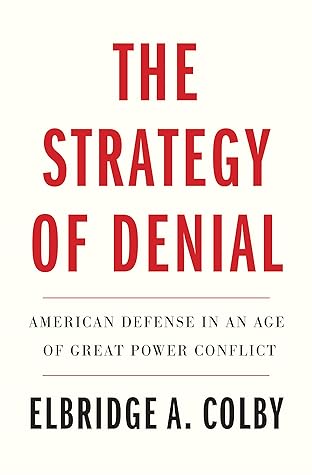More on this book
Kindle Notes & Highlights
Read between
March 21 - March 23, 2022
Denying China hegemony over Asia is therefore the cardinal objective of US grand strategy.
What matters most, however, is not American credibility in some general sense—that is, upholding every pledge or promise the United States has ever made, however imprudent—but US differentiated credibility in Asia: the degree to which important actors in the region believe that the United States will defend them effectively against China.
proportion to any gains. Accordingly, America’s best military strategy is a denial defense, or a strategy that seeks to deny China’s ability to use military force to achieve its political objectives.
The top priority for the US defense establishment should be ensuring that China cannot subordinate a US ally or quasi-ally in Asia, with the first priority being developing and maintaining the ability to conduct a denial defense of Taiwan.
To be effective, then, an anti-hegemonic coalition must involve enough states to be able to win such a war. These states may contribute in different ways—directly or indirectly, collectively or individually—but together they must be able to prevail in that contest if the coalition is to fulfill its purpose.
Second, a war to resolve the question of whether an aspirant like China would dominate a region like Asia might very well not engage the full power of one or both sides. In other words, such a war, even if very large, might remain limited in terms of the commitment of one or both sides. This is for a simple but extremely important reason—one or both sides might judge the perceived benefits of prevailing in such a total war not to be worth the costs and risks, and thus elect to restrain itself in the hopes of inducing restraint by the other side as well.
Normally, its interest is not to provoke such a war, since that would be costly for itself and reduce the value of its gains; rather, it is normally better off inducing other states to adjust their behavior based on the judgment that it would prevail if such a war were fought. If those other states perceive that a systemic regional war would result in victory by the aspirant, they will be impelled toward accommodating the aspirant’s demands in order to avoid the futile suffering such a war would entail.
Moreover, the strategy would almost certainly be a wasting one. Once China recognized that the United States was not seeking to directly defend its allies in the Western Pacific but was attacking China’s assets farther afield, Beijing could adapt its military accordingly. It could adjust the PLA’s force structure, posture, and operational concepts to shift away from the near battle, which was no longer being contested, to focus on protecting those more distant assets and on menacing America’s own. Given that US interests are far more dispersed around the world than China’s, it seems likely
...more


